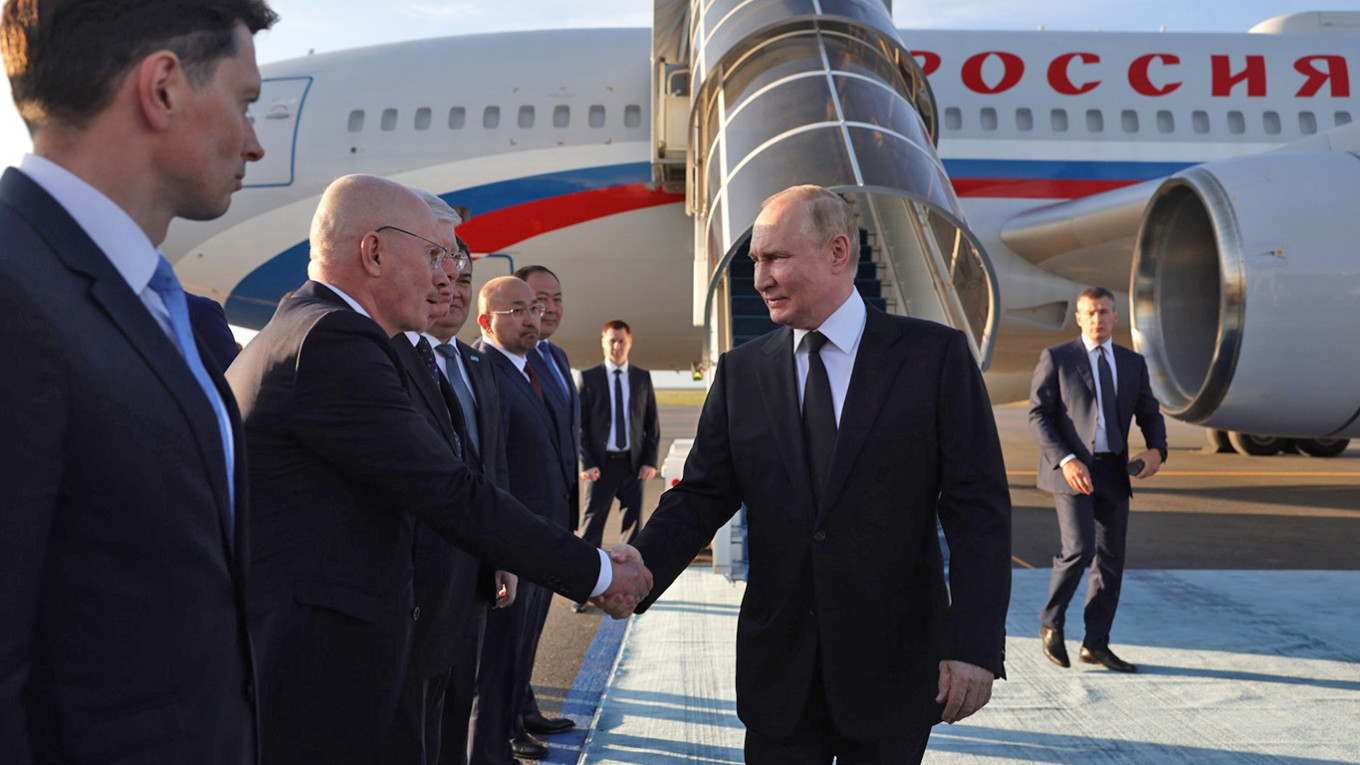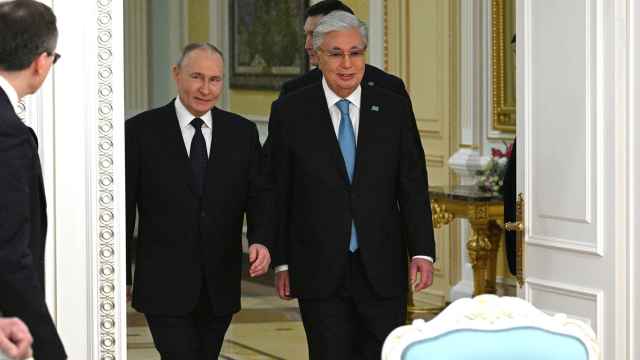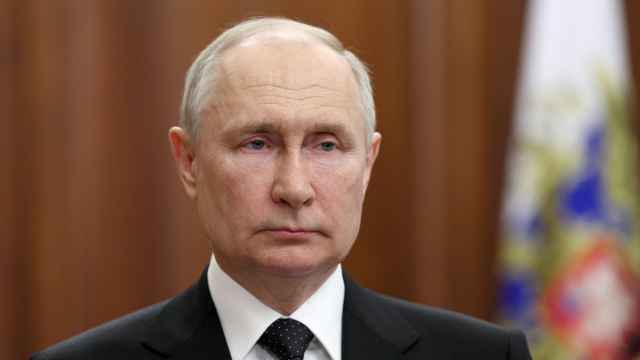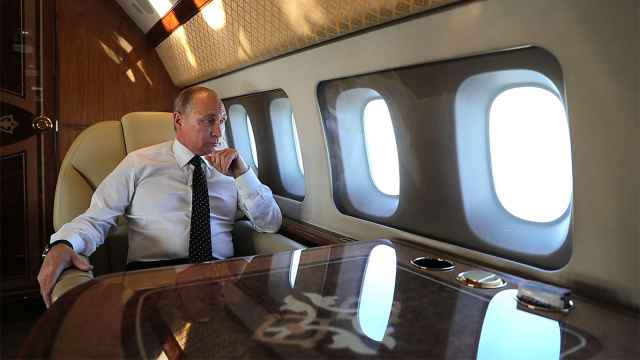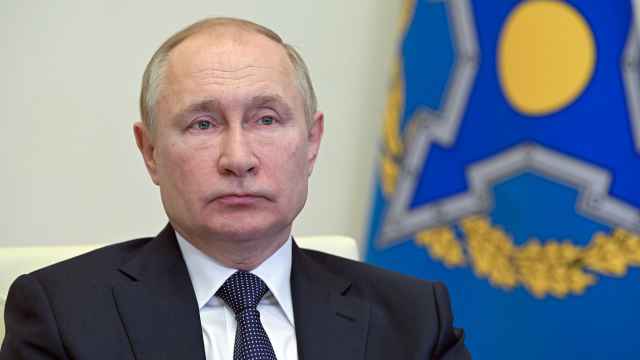The leaders of Russia and China on Wednesday hailed their efforts to harden their anti-Western alliance at a summit in Kazakhstan, seeking to press their influence in the strategic Central Asian region.
Vladimir Putin and Xi Jinping were in Astana for a meeting of the Shanghai Cooperation Organization (SCO) — a Beijing-led regional bloc that covers Central Asia, India and Iran and is designed as a counterweight to U.S. influence in international affairs.
In televised opening remarks ahead of a bilateral meeting, Putin told Xi that Russia's ties with China were stronger than ever and touted the SCO as a powerful instrument to advance their foreign policy agendas.
"Russian-Chinese relations, our comprehensive partnership and strategic cooperation, are experiencing their best period in history," Putin said.
Moscow and Beijing have deepened their political, military and economic links since Russia invaded Ukraine in February 2022.
Both countries have railed against what they call U.S.-led "hegemony" on the world stage and are trying to advance rival regional groups and alliances to push back against Western influence in regions they see as their backyards.
Putin said Wednesday that the SCO was "strengthening its role as one of the key pillars of a fair multipolar world order," using language characteristic of how Moscow bashes the West.
Ahead of the gathering, China's foreign ministry said the summit would "make contributions to promoting security, stability and development of member countries," and advance "lasting peace and common prosperity in the world."
Rivalry
China's Xi said Moscow and Beijing needed to continue developing relations despite difficult global circumstances.
"In the face of the turbulent international situation and external environment, the two sides should continue to uphold the original aspiration of friendship for generations to come," Xi told Putin in brief opening remarks.
Despite inking a "no limits" strategic partnership just days before Russia invaded Ukraine, Moscow and Beijing have been rivals for influence in the Central Asian region.
The five countries — Kazakhstan, Kyrgyzstan, Tajikistan, Turkmenistan and Uzbekistan — are ex-Soviet republics and have historic cultural, linguistic and economic ties to Russia.
But China's rising economic power and sprawling investment has challenged Russian influence.
Central Asia, key to China's flagship Belt and Road infrastructure project, is rich in natural resources and crucial for the overland transport of goods between China and Europe.
Russia's war on Ukraine has also been seen as creating an opening for other powers to swoop into regions that have been traditionally aligned with Moscow.
The ultra-closed Turkmenistan is not a member of the SCO, but the four other Central Asian states are, alongside India, Iran and Pakistan.
The nine-member bloc is complemented by 14 "dialogue partners," such as Turkey and several Gulf states.
'Fair peace'
Putin also met Turkey's President Recep Tayyip Erdogan on the sidelines of the summit.
The NATO member, which is positioning itself as a possible mediator in the Ukraine war, is a key trade and finance center for Moscow, which faces heavy Western sanctions.
Erdogan told Putin that Turkey "can lay the groundwork for a consensus to end the ongoing war between Russia and Ukraine, first with a ceasefire and then with peace," according to a readout from the Turkish presidency.
"A fair peace that can satisfy both sides is possible," it added.
Russia's close ally Belarus is set to formally join the SCO on Thursday.
In an interview with Kazakh state media, Belarus's President Alexander Lukashenko said the group was "demonstrating to the world that there are alternative international platforms, different centers of power."
UN Secretary-General Antonio Guterres also planned to address the two-day summit on Thursday.
A Message from The Moscow Times:
Dear readers,
We are facing unprecedented challenges. Russia's Prosecutor General's Office has designated The Moscow Times as an "undesirable" organization, criminalizing our work and putting our staff at risk of prosecution. This follows our earlier unjust labeling as a "foreign agent."
These actions are direct attempts to silence independent journalism in Russia. The authorities claim our work "discredits the decisions of the Russian leadership." We see things differently: we strive to provide accurate, unbiased reporting on Russia.
We, the journalists of The Moscow Times, refuse to be silenced. But to continue our work, we need your help.
Your support, no matter how small, makes a world of difference. If you can, please support us monthly starting from just $2. It's quick to set up, and every contribution makes a significant impact.
By supporting The Moscow Times, you're defending open, independent journalism in the face of repression. Thank you for standing with us.
Remind me later.


